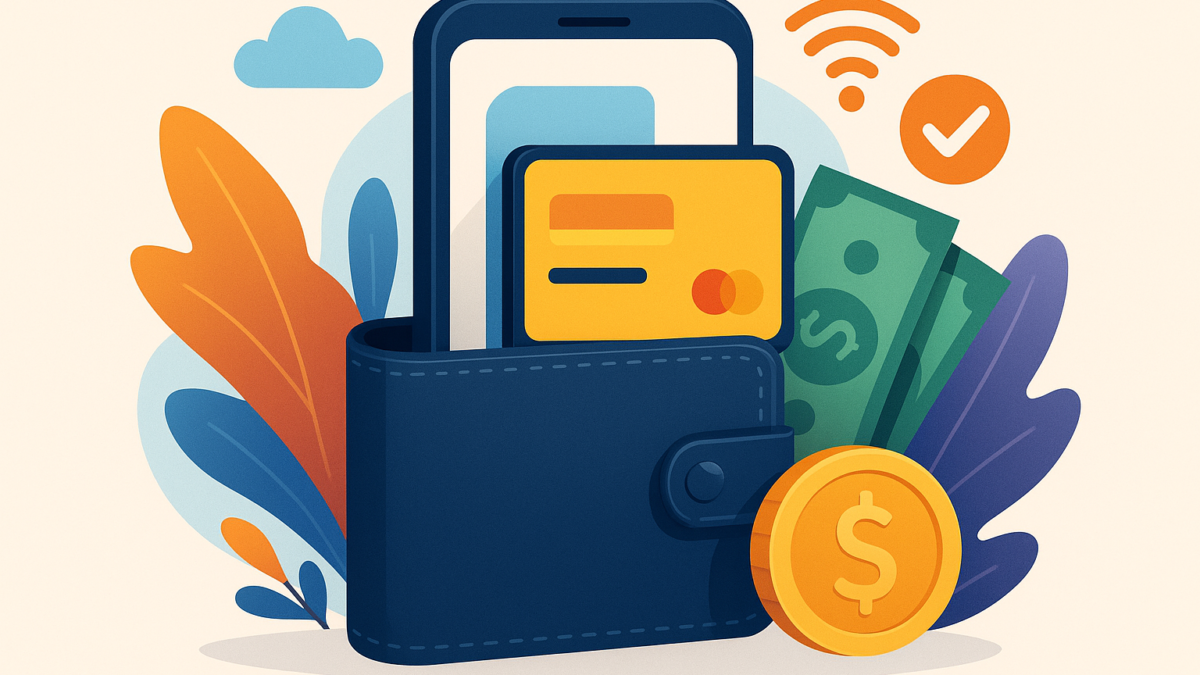Digital Wallets in FinTech: The Future of Money in Your Pocket
Table of Contents
The days of carrying cash and cards are fading fast. In 2025, digital wallets have become the new standard for payments worldwide. From Apple Pay and Google Wallet to homegrown FinTech players, these apps have revolutionized how people shop, transfer money, and even invest.
Digital wallets aren’t just convenient—they’re a cornerstone of the FinTech revolution, shaping how financial services are delivered, secured, and scaled.
What Are Digital Wallets?
A digital wallet is a virtual tool that securely stores payment information, such as debit/credit cards, bank accounts, and even digital assets like cryptocurrencies.
With a few taps on your phone, you can:
- Pay for groceries in-store.
- Transfer money to a friend.
- Book a flight.
- Store loyalty cards and rewards.
For businesses, digital wallets also provide faster checkouts, reduced friction, and higher customer satisfaction.
The Rise of Digital Wallets in FinTech
Digital wallets have become central to FinTech’s growth because they:
- Enable Cashless Economies: Governments worldwide are promoting digital payments to reduce dependency on cash.
- Support Financial Inclusion: In regions without traditional banking infrastructure, wallets provide a gateway to financial services.
- Integrate With FinTech Ecosystems: Wallets now support investments, lending, and even insurance services.
Key Features Driving Adoption
1. Contactless Payments
Tap-to-pay via NFC has made in-store payments quicker and safer.
2. Peer-to-Peer Transfers
Apps like PayPal, Venmo, and Paytm have made instant money transfers the norm.
3. Multi-Currency & Crypto Support
Many wallets now allow storage and spending of cryptocurrencies alongside fiat money.
4. Loyalty & Rewards Integration
Wallets consolidate coupons, memberships, and cashback offers into one place.
5. Enhanced Security
Biometric logins, tokenization, and AI-powered fraud detection keep transactions secure.
Global Leaders in Digital Wallets
- Apple Pay & Google Wallet – Dominating developed markets.
- PayPal & Venmo – Leading in online payments and P2P transfers.
- Alipay & WeChat Pay – Driving cashless adoption in China.
- Paytm, PhonePe, GPay (India) – Enabling mass digital transactions in one of the world’s largest FinTech ecosystems.
These wallets highlight how local and global players shape consumer adoption.
Benefits for Consumers & Businesses
For Consumers
- Convenience: One app, many payment options.
- Speed: Instant transactions across platforms.
- Security: Advanced encryption and fraud monitoring.
For Businesses
- Higher Conversions: Smooth checkout reduces cart abandonment.
- Lower Costs: Reduced reliance on expensive card infrastructure.
- Customer Insights: Wallets provide valuable transaction data.
Challenges Ahead
Despite rapid growth, digital wallets face hurdles:
- Data Privacy Concerns: Storing financial data digitally raises cybersecurity risks.
- Regulatory Barriers: Different countries have varying rules on digital finance.
- Competition: With so many wallet apps, consumer loyalty is fragmented.
- Infrastructure Gaps: In some regions, lack of internet or smartphone access slows adoption.
The Future of Digital Wallets in FinTech
The next wave of digital wallets will focus on:
- AI-Powered Financial Management – Helping users budget and invest.
- Cross-Border Payments – Simplifying global money transfers.
- Integration with Web3 – Storing NFTs, digital IDs, and decentralized assets.
- Super Apps – Wallets evolving into all-in-one financial platforms.
By 2030, digital wallets may become the default banking interface for millions, blurring the line between banks, FinTechs, and tech giants.
Final Thoughts
Digital wallets are no longer a luxury—they’re a necessity in the FinTech-driven cashless economy. For consumers, they deliver convenience and security. For businesses, they offer faster growth and deeper insights.
As FinTech continues to evolve, digital wallets will sit at the center of innovation—transforming not just how we pay, but how we manage money altogether.





